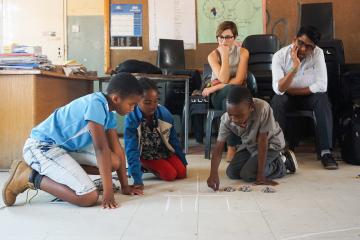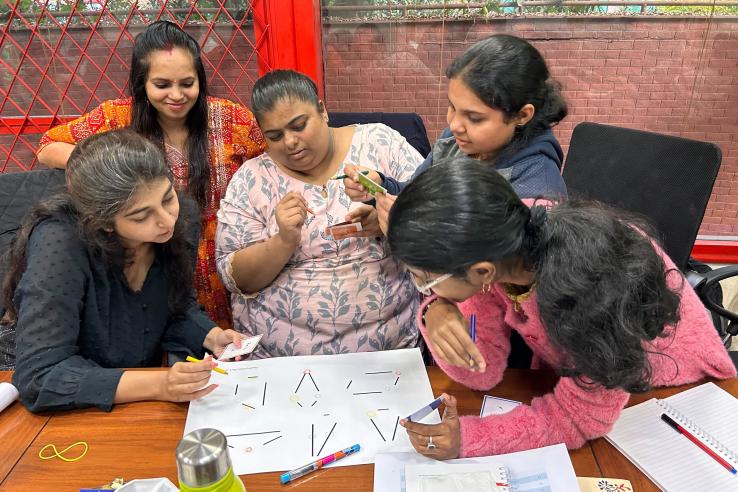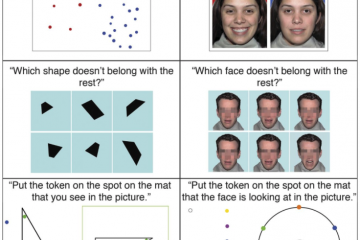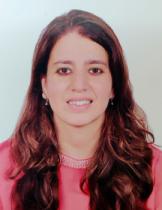
The making of an NGO consortium to scale up “Every Child Counts” in India

The need for improved foundational skills
India has made remarkable progress in getting its children into schools. Nearly every eligible child is enrolled in a primary school today. But many of them struggle to read simple sentences and do basic arithmetic. In rural India, the Annual Status of Education Report (ASER) 2023 found that more than half of children in middle and high schools cannot solve math problems taught in primary schools. Three out of five children in grade three even struggle to recognize numbers. These children need special support to strengthen their foundational learning capabilities.
The Government of India has been making concerted efforts in this direction with its National Initiative for Proficiency in Reading with Understanding and Numeracy (NIPUN Bharat mission. Launched in 2021, NIPUN Bharat emphasizes on making classroom learning in the early years engaging through puzzles, quizzes, and games. A fun and interactive learning environment plays an important role in child development. It can build not just the cognitive abilities of children but also their social and creative skills.
Every Child Counts: Learning through math games
Every Child Counts—a game-based curriculum designed for four-to-six-year-old children—has emerged as a powerful tool to strengthen their foundational concepts of numeracy and geometry. The curriculum was developed by leveraging research in cognitive science and developmental psychology, through collaborative and iterative efforts between economists and cognitive psychologists such as Elizabeth Spelke and others.
It comprises four games, designed to strengthen children's ability to recognize numbers and perform basic arithmetic as well as identify shapes and their properties.
Since 2020, J-PAL South Asia has been working with its partners to introduce the games’ curriculum across India. It has supported the pilots led by the NGO Pratham in Himachal Pradesh, Delhi, and Punjab. It has also collaborated with the Government of Andhra Pradesh and Maharashtra to pilot the curriculum in state-run schools.
Now, with a special training program for civil society organizations, J-PAL South Asia’s efforts to scale up Every Child Counts in India have entered a new phase.
This effort is being generously supported by USAID’s Development Innovation Ventures and the Alliance for Scaling Policy Impact through Research and Evidence (ASPIRE).
Bringing Every Child Counts to more Indian classrooms
Every Child Counts’s journey began in India in 2013 when a research team led by J-PAL co-founder Esther Duflo piloted the curriculum in select Balwadis (special early childhood education centers) run by NGO Pratham in India’s capital of New Delhi.
An evaluation led by Duflo, Spelke, and their team found that the games led to a long-term improvement in children’s innate ability to recognize numerical magnitudes and geometric forms. They spent the next six years designing and evaluating different versions of the curriculum.
There is an immediate need to expand the reach of interventions with proven effectiveness to solve the global learning crisis. Under current trends, the United Nations’ The Sustainable Development Goals Report estimates that approximately 300 million students around the world will be unable to read and write by 2030.
In a country as large and as diverse as India, it is nearly impossible for any single organization to solve deeply entrenched policy issues such as foundational learning. Long-term, multi-stakeholder partnerships are critical so evidence-based programs can be adapted to local contexts for maximum impact. We learnt it early in our 17-year-long (and counting) journey in India.
With that in mind, J-PAL South Asia launched an innovative knowledge-transfer program for civil society organizations to create a consortium which can rapidly accelerate the adoption of Every Child Counts in India. The inaugural edition of this program was held in November 2023 in Delhi.
Empowering the educators
Our first cohort comprised nine enthusiastic participants from three NGOs: TiTLi Early Childhood Training Institute (TiTLi), Centre for Learning Resources (CLR), and Key Education Foundation (KEF).
The participants—specializing in curriculum development and implementation—were trained to become “champions” so they could implement Every Child Counts in their communities and identify pathways to scale it.
The workshop seamlessly blended theory and practice. Harini Kannan, one of the researchers on the evaluation, gave the participants a solid grounding in the curriculum, the science behind it, and the evidence from the randomized evaluations. The participants even tried their hand at playing the games, enjoying them as much as the children.
“The [games] are so beautifully crafted—simple, fun but effective means to enhance cognitive skills in young children… The team ensured the training was hands-on and playful and was very open to feedback. I am very excited to take this to our classrooms…” said Swetha Guhan, Co-Founder and Director, KEF, a Bangalore-based NGO.
The group spent the last two days drawing up plans to implement Every Child Counts in classrooms, taking its first step in putting the theoretical lessons from the previous days into action.
Soon after the training ended, our participants began introducing Every Child Counts in their communities. They started an eight-week pilot in kindergarten schools and Anganwadis (rural education and health care centers for children) in Karnataka, Uttar Pradesh, and Jharkhand, reaching 1000 children.
Both teachers and pupils, our participants say, are enjoying the games. Some teachers are even using them to teach children formal math concepts such as number counting and identification of shapes in everyday objects.
Grassroot NGOs are the superstars
For a program to work at scale, it must be adapted to the local realities. A one-size-fits all strategy is unlikely to succeed.
It then follows that an effective strategy to scale up evidence-based programs must involve grassroots organizations with deep local knowledge and should facilitate knowledge-sharing among them. That’s what our consortium on Every Child Counts intends to do.
Our knowledge-transfer workshop in November was the first of the many we have in mind to engage with civil society organizations working on early childhood education as we grow the consortium.
The consortium partners will spearhead the scale-up of the curriculum in their communities. Along the way, they will be sharing their lessons and insights with each other to build the collective knowledge and expertise of the consortium.
Sure, we are in the early stages of what is going to be a long journey. But only by working together can we make Every Child Counts as the cornerstone of foundational learning in India.
A note of gratitude from the authors
The authors of this blog would like to thank Vijayalakshmi Iyer, Parikrama Chowdhry and Harini Kannan for their guidance, Trisha Pande, Tanya Jha, Saptarishi Dutta, and Eliza Keller for their suggestions and edits, the Every Child Counts team for their support during the project, and, last but not the least, the three organizations for participating in the course in 2023-24.
Related Content

Informal Math Games to Improve Children's Readiness for Learning School Mathematics in India

Not as easy as A, B, C, 1, 2, 3: Emphasizing transparency in measuring holistic skills


